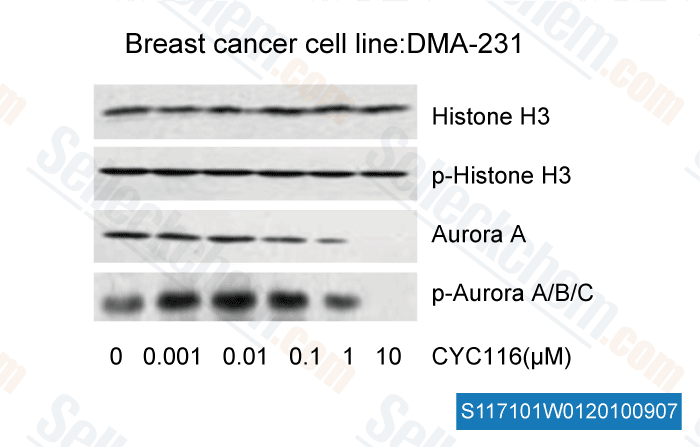|
Toll Free: (877) 796-6397 -- USA and Canada only -- |
Fax: +1-832-582-8590 Orders: +1-832-582-8158 |
Tech Support: +1-832-582-8158 Ext:3 Please provide your Order Number in the email. |
Technical Data
| Formula | C18H20N6OS |
|||
| Molecular Weight | 368.46 | CAS No. | 693228-63-6 | |
| Solubility (25°C)* | In vitro | DMSO | 37 mg/mL (100.41 mM) | |
| Water | Insoluble | |||
| Ethanol | Insoluble | |||
|
* <1 mg/ml means slightly soluble or insoluble. * Please note that Selleck tests the solubility of all compounds in-house, and the actual solubility may differ slightly from published values. This is normal and is due to slight batch-to-batch variations. * Room temperature shipping (Stability testing shows this product can be shipped without any cooling measures.) |
||||
Preparing Stock Solutions
Biological Activity
| Description | CYC116 is a potent inhibitor of Aurora A/B with Ki of 8.0 nM/9.2 nM, is less potent to VEGFR2 (Ki of 44 nM), with 50-fold greater potency than CDKs, not active against PKA, Akt/PKB, PKC, no effect on GSK-3α/β, CK2, Plk1 and SAPK2A. Phase 1. | |||||||||||
|---|---|---|---|---|---|---|---|---|---|---|---|---|
| Targets |
|
|||||||||||
| In vitro | The most Aurora-selective CYC116 shows inhibitory effect on Aurora A and B kinases 50-fold more potently than any of the CDKs assayed. [1] CYC116 is initially screened against a panel of human leukemia and solid tumor cell lines using an MTT antiproliferative assay. The results show that CYC116 has broad-spectrum antitumor activity and shows specific cytotoxicity against the acute myelogenous leukemia cell line MV4-11 with IC50 of 34 nM. [1] In addition, anti-proliferative activity of CYC116 is found to be associated with Aurora A and B modulation such as, inhibition of Aurora autophosphorylation, reduction of histone H3 phosphorylation, polyploidy, followed by cell death, resulting from a failure in cytokinesis. [1] | |||||||||||
| In vivo | Mice bearing subcutaneous NCI-H460 xenografts are given CYC116 orally for 5 days, at dose levels of 75 and 100 mg/kg q.d. It leads to tumor growth delays of 2.3 and 5.8 days, which translated into specific growth delays of 0.32 and 0.81, respectively. [1] | |||||||||||
| Features | An orally bioavailable, small molecule inhibitor of Aurora kinase/VEGFR2. |
Protocol (from reference)
| Kinase Assay:[1] |
|
|---|---|
| Cell Assay: |
|
| Animal Study: |
|
Customer Product Validation

-
Data independently produced by Dr Zhang of Tianjin Medical University,
Selleck's CYC116 has been cited by 10 publications
| Inhibition of epigenetic and cell cycle-related targets in glioblastoma cell lines reveals that onametostat reduces proliferation and viability in both normoxic and hypoxic conditions [ Sci Rep, 2024, 14(1):4303] | PubMed: 38383756 |
| DELs enable the development of BRET probes for target engagement studies in cells [ Cell Chem Biol, 2023, 30(8):987-998.e24] | PubMed: 37490918 |
| A screen of repurposed drugs identifies AMHR2/MISR2 agonists as potential contraceptives [ Proc Natl Acad Sci U S A, 2022, 119(15):e2122512119] | PubMed: 35380904 |
| Inhibition of IκB Kinase Is a Potential Therapeutic Strategy to Circumvent Resistance to Epidermal Growth Factor Receptor Inhibition in Triple-Negative Breast Cancer Cells [ Cancers (Basel), 2022, 14(21)5215] | PubMed: 36358633 |
| Using antagonistic pleiotropy to design a chemotherapy-induced evolutionary trap to target drug resistance in cancer. [ Nat Genet, 2020, 52(4):408-417] | PubMed: 32203462 |
| Chemosensitivity and chemoresistance in endometriosis - differences for ectopic versus eutopic cells. [ Reprod Biomed Online, 2019, 10.1016/j.rbmo.2019.05.019] | PubMed: 31377021 |
| An Anti-Cancer Drug Candidate CYC116 Suppresses Type I Hypersensitive Immune Responses through the Inhibition of Fyn Kinase in Mast Cells [ Biomol Ther (Seoul), 2019, 27(3):311-317] | PubMed: 30332888 |
| Targeted Polo-like Kinase Inhibition Combined With Aurora Kinase Inhibition in Pediatric Acute Leukemia Cells. [ J Pediatr Hematol Oncol, 2019, 41(6):e359-e370] | PubMed: 30702467 |
| Aurora Kinases as Druggable Targets in Pediatric Leukemia: Heterogeneity in Target Modulation Activities and Cytotoxicity by Diverse Novel Therapeutic Agents [Jayanthan A, et al. PLoS One, 2014, 9(7):e102741] | PubMed: 25048812 |
| Targeting Sonic Hedgehog-Associated Medulloblastoma through Inhibition of Aurora and Polo-like Kinases. [Markant SL, et al. Cancer Res, 2013, 73(20):6310-22] | PubMed: 24067506 |
RETURN POLICY
Selleck Chemical’s Unconditional Return Policy ensures a smooth online shopping experience for our customers. If you are in any way unsatisfied with your purchase, you may return any item(s) within 7 days of receiving it. In the event of product quality issues, either protocol related or product related problems, you may return any item(s) within 365 days from the original purchase date. Please follow the instructions below when returning products.
SHIPPING AND STORAGE
Selleck products are transported at room temperature. If you receive the product at room temperature, please rest assured, the Selleck Quality Inspection Department has conducted experiments to verify that the normal temperature placement of one month will not affect the biological activity of powder products. After collecting, please store the product according to the requirements described in the datasheet. Most Selleck products are stable under the recommended conditions.
NOT FOR HUMAN, VETERINARY DIAGNOSTIC OR THERAPEUTIC USE.
